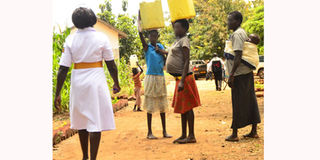Prime
Gender-based violence victims need more shelter, say activists

Pregnant teenagers in Palabek Ogili Village in Lamwo District.There are few temporary shelters for victims of sexual and gender violence. PHOTO | KELVIN ATUHAIRE
Gender rights activists in Bunyoro Sub-region have appealed to government to build more temporary shelters for victims of gender-based violence in order to protect them.
Although the Domestic Violence Act, 2010, which calls for the establishment of the shelters was passed a decade ago, activists say implementation of some clauses in the law remains minimal.
For instance, on June 11, the Criminal Investigations and Intelligence Directorate at Hoima Police headquarters referred a 15-year-old pregnant teenager to Kampala for temporary accommodation.
The teenager was allegedly defiled by her uncle, who is still at large.
“The victim is an orphan who has been staying with her paternal uncle. It was unfortunate that he ended up defiling and impregnating her. The same uncle is now threatening the victim since he has not yet been arrested. However, efforts are underway to have him arrested for prosecution,” the police’s referral letter to Centre for Health, Human Rights and Development, a civil society organisation in Kampala, reads in part.
The victim is among thousands of survivors of sexual and gender-based violence across the country in need of temporary shelter.
Cases in Bunyoro
Statistics from Hoima Police Station indicate that in the first half of this year, 595 murders were registered in Bunyoro out of which 10 were a result of domestic violence.
The figures also indicate that 67 cases of gender-based violence were recorded in Hoima District during the Covid-19 lockdown period.
Mr Amos Isaac Bitamale, the district senior probation and welfare officer, said several women sought letters to enable them flee from their husbands.
“Unfortunately, we did not give them the letters since this would have contravened the Ministry of Health Covid-19 guidelines at the time,” Mr Bitamale said last week.
“If the district had shelters, we could accommodate such categories of women. Allowing them to go back to their tormenting husbands has resulted in some of them being murdered. It is high time that we built some shelters in the Bunyoro region to reduce such crimes,” he added.
Another case involved a suspect in Kigorobya Village 1, Kigorobya Sub-county, who allegedly defiled five girls aged between five and eight years.
Mr Bitamale said if there was shelter, the girls would have been taken there for medical examination and legal support.
A doctor’s report indicated that the parents of one of the victims delayed to seek medical examination and therefore, they could not ably detect any signs of defilement.
The office of the Director of Public Prosecutions in Hoima has since declined to sanction defilement charges against the suspect on grounds that the evidence is not sufficient to prosecute him.
Ms Noor Nakibuuka Musisi, the programme director at Centre for Health, Human Rights and Development, an NGO, said the shelters are essential because government recognises that women need more protection.
“The fact that government documents such as the Uganda Demographic and Health Survey and National Sexuality Education Framework reveal that women are twice more likely to experience sexual violence than men, government should construct shelters to provide safety to those women,” Ms Musisi said.
Ms Judith Nakalembe, a gender-based violence specialist, yesterday said safety and protection of vulnerable women is essential in addressing the vice.
Ms Nakalembe said some victims sleep at police counters because there are no shelters.
Mr James Ebitu, the Permanent Secretary in the Gender ministry, on Friday acknowledged need for more shelters, saying there are only 16 government ones for gender-based violence victims.
“There are indications of the need for more shelters but this depends on the availability of resources. But for that child’s case (15-year-old), police would have called the child toll free help number, 116 and the officials in Naguru centre in Kampala would have provided her with temporary shelter,” Mr Ebitu said.
He said survivors of sexual violence need to be integrated into communities where they can be respected.
By April 17, police had registered 328 domestic violence-related cases across the country since the lockdown.
Purpose of shelters
• Provide temporary accommodation as referal linkages are made to ensure the victims /survivors are assisted.
• Provide emergency care or first aid.
• Provide counselling, psychosocial support and legal aid as applicable.
• Enable victims/survivors to cope with the after-effects of violence through life skills and capacity building programmes.
• Provide community outreach activities, including case follow ups, family reconciliation, security planning, resettlements and building support networks.
• Facilitate the reintegration in school and in a safe family environment of the child victim/ survivor.
• Facilitate access to education/ learning for children at the shelters.



